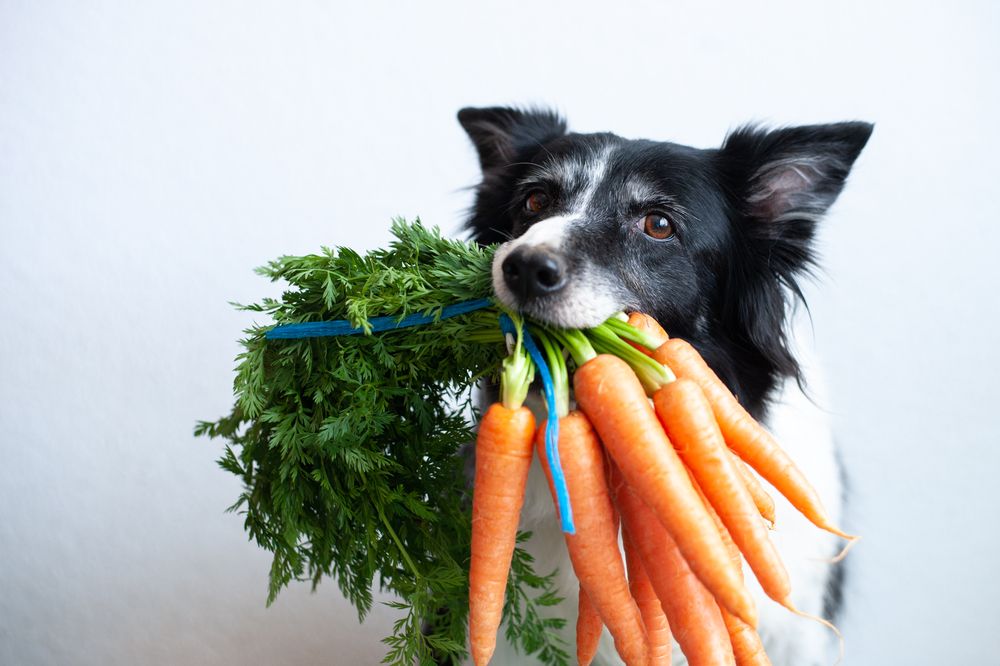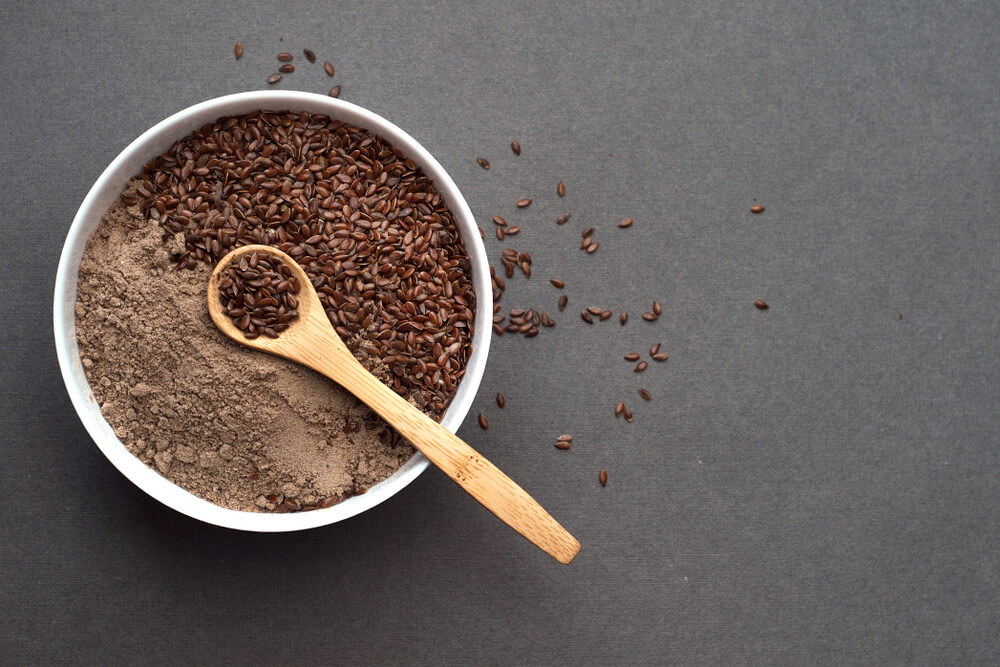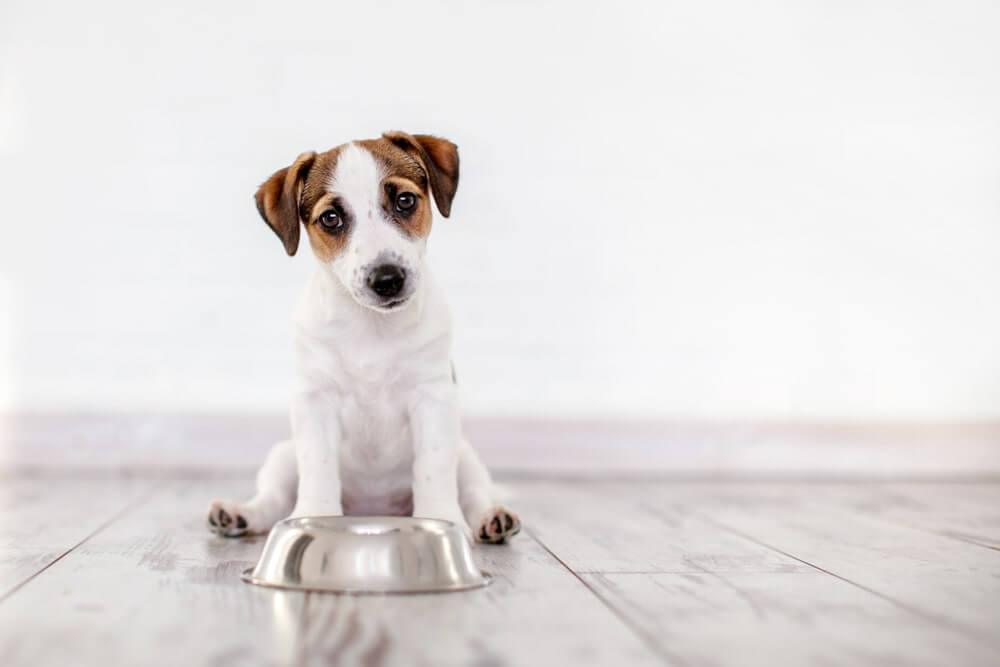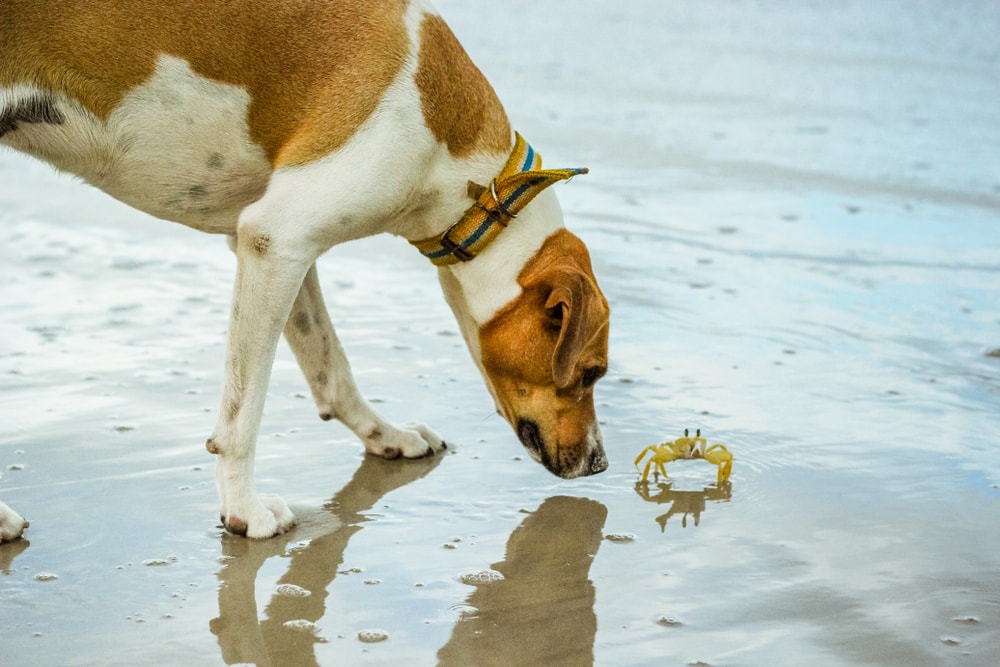Hey Ollie blog readers! We’re offering you an exclusive 60% OFF your starter box! Try now!
Can dogs eat carrots and are carrots good for dogs to eat? The answer is yes on both counts! The crunchy orange vegetable isn’t just a nutritious snack for humans, it’s also a healthy treat for dogs.
Can Dogs Eat Carrots?
Yes, dogs can eat carrots! These crunchy, nutritious vegetables are a great addition to your dog’s diet, offering a variety of health benefits. Carrots are packed with essential vitamins and minerals, including vitamin A, which supports vision and immune health, and fiber, which aids digestion. Plus, their natural crunch can help keep your dog’s teeth clean.
Carrots are also low in calories, making them an excellent treat option for dogs who need to manage their weight. Whether served raw, cooked, or frozen, they provide a satisfying snack without unnecessary fats or additives. Many dogs love the sweet, mild flavor, making carrots a tasty and healthy reward.
While carrots are safe for dogs, proper preparation is key. Whole carrots can be a choking hazard, especially for small dogs, so it’s best to chop them into bite-sized pieces. You can also steam or cook carrots to make them softer and easier to chew. Always introduce new foods gradually and in moderation to ensure they agree with your dog’s digestive system.
Carrots can be a part of your dog’s nutritious, balanced diet. Here’s exactly why carrots are good for dogs most of the time – as well as a few potential risks associated with feeding your dogs carrots.
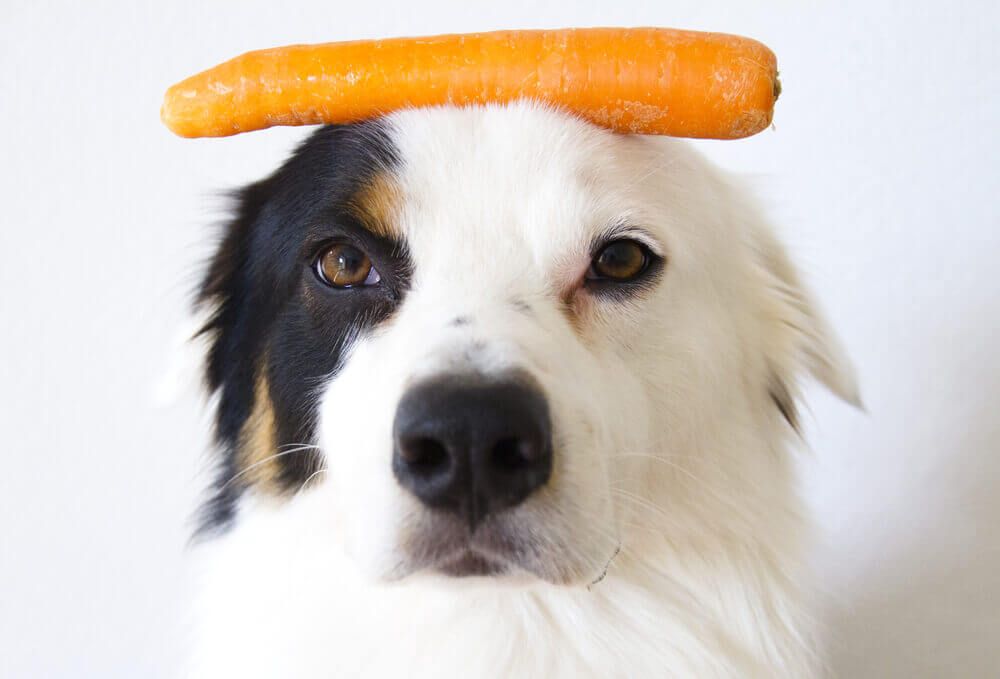
Are Carrots Safe for Dogs?
Yes, carrots are completely safe for dogs when given in appropriate portions. They are non-toxic and provide a healthy alternative to processed treats. Unlike some vegetables that can be harmful to dogs, such as onions or garlic, carrots pose no risk of toxicity. This makes them a worry-free snack for pet owners looking to add variety to their dog’s diet.
One of the biggest concerns when feeding carrots to dogs is the risk of choking, especially for small breeds or dogs that tend to gulp their food. To keep your pup safe, always cut carrots into small, manageable pieces. If your dog has trouble chewing or has dental issues, cooked or steamed carrots can be a softer alternative that’s easier to eat. According to the American Kennel Club, carrots are a safe, low-calorie treat for dogs and a great source of essential nutrients like fiber and vitamin A.
Another thing to consider is portion control. While carrots are nutritious, feeding too many can lead to digestive upset due to their fiber content. A few slices make a great snack, but excessive amounts could cause gas or loose stools. As with any new food, it’s best to introduce carrots gradually and monitor your dog for any signs of discomfort.
Health Benefits of Carrots For Dogs
Because carrots are low in calories, high in fiber, and packed with nutrients, they make an excellent snack or treat for dogs. Their natural sweetness and satisfying crunch make them a great option for pups who love to munch. Plus, for dogs who need to manage their weight, carrots provide a filling, guilt-free treat between meals.
Carrots are a powerhouse of essential vitamins and minerals, including:
- Vitamin A – Supports eye health, immune function, and skin health. Severe vitamin A deficiency can lead to vision impairment and even blindness.
- Vitamin K – Helps with blood clotting, which is essential for wound healing.
- Potassium – Supports muscle strength, nerve function, and heart health.
- Carotenoids – Act as antioxidants and promote heart health.
Along with providing essential vitamins and minerals, carrots have a few other potential health benefits:
- Supports Dental Health – The crunchy texture of raw carrots helps reduce plaque buildup and naturally cleans teeth as dogs chew.
- Aids Digestion – Carrots are high in fiber, which can help regulate bowel movements and prevent constipation.
- Hydration Support – Carrots have a high water content, making them a hydrating snack, especially in warmer months.
- Joint Health – The antioxidants in carrots may help reduce inflammation, which can benefit dogs with arthritis or joint pain.
- Mental Stimulation – Chewing on a whole or frozen carrot can provide a fun, engaging activity for dogs, helping to relieve boredom and promote good behavior.
So, as you can see, there are many benefits associated with feeding carrots to dogs. That’s why Ollie mixes carrots into a number of its Recipes Chicken, Turkey , and Beef. Ollie’s vet-designed mix of superfoods, including carrots, is formulated to meet the nutritional levels established by the AAFCO Dog Food Nutrient Profiles for All Life Stages.
Carrot Nutrition for Dogs
Carrots aren’t just a crunchy snack—they’re a powerhouse of natural nutrition for dogs. These root veggies are low in calories and packed with vitamins, fiber, and antioxidants that support your pup’s overall health.
Here’s a look at what makes carrots a smart choice:
| Nutrient | How It Helps Your Dog |
|---|
| Beta-Carotene | Converts to vitamin A to support vision and immunity |
| Vitamin A | Helps maintain skin, coat, and cellular health |
| Fiber | Aids digestion and promotes regular bowel movements |
| Vitamin K | Supports healthy bones and blood clotting |
| Potassium | Assists with muscle and nerve function |
| Low in Fat & Calories | Great for weight control and low-calorie snacking |
Fun fact: Just one baby carrot contains about 4 calories—making it a guilt-free treat for dogs watching their weight.
How To Safely Serve Carrots To Your Dog
Dogs can eat carrots either raw or cooked, so it’s really up to your pup how they like them best. Here we broke down some of the benefits and even a few things to watch for when sharing carrots with your pup.
Raw carrots for dogs
Uncooked carrots are an easy, healthy snack for dogs. Remember to wash carrots first to remove any pesticides, which can be harmful to dogs. If you’re mixing raw carrots into your dog’s food or if you have a small dog, be careful to chop the carrots up into small pieces to avoid any risk of choking.
While most dogs can digest carrots without any problems, some dogs do have difficulty. After feeding your dog a raw carrot, check his stool to make sure there aren’t large, undigested chunks, which might suggest an issue he’s having with the veggie.
Baby carrots for dogs
Dogs can eat baby carrots in the same way they can eat larger raw carrots! Baby carrots take some of the chopping work out of your hands. If you have a very small dog, however, cut the baby carrots in halves or thirds.
Carrot tops for dogs
Yes, dogs can even eat the leafy green carrot tops! Again, make sure to wash them and cut them into bite-sized bits.
Cooked carrots for dogs
Cooked carrots lower the risk of choking for dogs and may be easier for them to digest than raw carrots. Cooked carrots can be mixed into your dog’s food for an extra vitamin boost. Pssst! Ollie’s Beef, Chicken, and Turkey study all include gently cooked carrots as a source of essential nutrients and dietary fiber. As all carrots are high in fiber, the only real risk is over-eating. Too much fiber in a dog’s diet can lead to vomiting and diarrhea. It’s best to ask your veterinarian what the recommended amount of carrots is for your particular pup.
Frozen carrots for dogs
Some veterinarians recommend freezing whole carrots and giving them to puppies as a way to relieve teething pain while also providing some vitamins and minerals.
Frozen carrots also act as a low-cost object for dogs to chew on, especially for dogs that chew aggressively. If you do feed your dog a frozen treat frozen treat like carrots, leave them whole rather than cutting them up into bits, to prevent choking. Never give your dog or puppy frozen baby carrots. To minimize the risk of choking, even with whole frozen carrots, supervise your pup when you feed frozen carrots.
Can Carrots Clean A Dog’s Teeth?
Carrots won’t replace brushing your dog’s teeth—but they can help support better dental health.
The crunchy texture of raw carrots can help gently scrape away some plaque and food debris from your dog’s teeth as they chew. It’s a bit like nature’s version of a chew toy, especially when served cold or frozen.
Pro Tip: Offer your dog a chilled carrot stick after meals as a light dental-friendly snack.
That said, carrots don’t contain the enzymes or abrasives found in actual dog toothpaste. For full dental care, you’ll still want to brush regularly and check in with your vet for professional cleanings.
Benefits of Carrots for Dental Support:
- Natural chewing action helps reduce soft plaque buildup
- Encourages jaw movement and gum stimulation
- Offers a safe, non-splintering texture compared to bones or hard chews
According to the American Veterinary Dental College, “Mechanical chewing can help reduce tartar—but brushing is still the gold standard for keeping a dog’s mouth clean.”
How to Safely Serve Carrots to Dogs
Carrots are super versatile, but how you serve them can make a big difference in safety and digestibility. Here are a few dog-friendly ways to prep carrots:
Raw Carrots
- Great for a crunchy snack or teething puppies.
- Slice or shred to prevent choking—especially for small dogs.
- Rinse thoroughly to remove any dirt or pesticide residue.
Baby Carrots
- Perfect size for medium and large dogs.
- For small breeds, cut them into bite-sized rounds or strips.
- Refrigerate or freeze for a satisfying, cooling chew.
Cooked Carrots
- Lightly steamed or boiled carrots are easier to digest.
- Cooking softens the texture and brings out natural sweetness.
- Avoid adding salt, butter, or seasonings.
Frozen Carrots
- Freeze carrot sticks for a soothing teething treat.
- Ideal for hot days or dogs who enjoy a little crunch.
- Supervise while chewing to prevent gulping.
Always introduce carrots gradually and in moderation. Even healthy snacks can lead to upset stomachs if given too much at once.
Any Potential Health Risks of Carrots for Dogs?
Carrots are safe for most dogs—but like any food, they come with a few things to keep in mind.
1. Digestive Upset
Carrots are high in fiber, which is great in moderation—but too much too fast can lead to gas, bloating, or loose stools.
Start small. Introduce carrots slowly, especially if your dog’s diet doesn’t usually include raw vegetables.
2. Choking Hazard
Large chunks or whole carrots can pose a choking risk, especially for small dogs or fast eaters.
Always cut carrots into bite-sized pieces. For puppies or seniors, cook or steam them to soften the texture.
3. Sugar Content
Carrots contain natural sugars. While they’re much lower in sugar than fruits, overfeeding can still be an issue—especially for dogs with diabetes or weight concerns.
A few slices or 1–2 baby carrots a day is plenty for most dogs. Keep portions in check if your dog is on a special diet.
4. Allergic Reactions (Rare)
It’s uncommon, but dogs can have food sensitivities—including to carrots. Symptoms might include itching, skin irritation, or digestive issues.
If your dog shows any unusual symptoms after eating carrots, pause and check in with your vet.
Carrots For Dogs FAQs
Can dogs eat raw carrots?
Yes! Raw carrots are safe and nutritious. Just slice or shred them to make chewing easier and reduce choking risk.
Are carrots good for dogs?
Definitely. Carrots are rich in fiber, antioxidants, and beta-carotene, making them a healthy low-calorie treat that supports vision, digestion, and immune function.
How many carrots can dogs eat per day?
- Small dogs: 1–2 baby carrots or a few slices.
- Medium dogs: 3–4 baby carrots.
- Large dogs: Up to ½ cup chopped carrots.
- Too much can cause gas, so start slow.
Can puppies eat carrots?
Yes, but cook or finely chop them first. Carrots are great for teething and help promote healthy chewing habits.
Are carrots good for overweight dogs?
Yes! Carrots are low in calories and high in fiber, making them a great alternative to high-fat treats.
Can diabetic dogs eat carrots?
Carrots contain natural sugars but have a low glycemic load. In small amounts, they’re usually safe—but always consult your vet if your dog has diabetes.
The Ollie blog is devoted to helping pet parents lead healthier lives with their pups. If you want to learn more about our fresh, human-grade food, check out MyOllie.com.
Tagged As:

The nutrition your dog needs,
the food they want.

Enjoying our articles? Subscribe our Newsletters and get new articles directly to your inbox
You might also like
18 September 2025
6 MINS READ
Can Dogs Eat Flaxseed? Is Flaxseed Safe For Dogs?
Wondering if flaxseed is safe for your dog? This guide breaks down the benefits, risks, and best ways to add flaxseed, or flaxseed oil, to your pup’s diet.
18 September 2025
6 MINS READ
Why is My Dog Not Eating But Acting Normal? Causes & What To Do
Worried your dog isn’t eating but still acting normal? Here’s what could be going on and what to do to help your pup get their appetite back.
18 September 2025
5 MINS READ
Can Dogs Eat Crab? Is Crab Meat Safe For Dogs?
Thinking about giving your dog crab meat? Find out if it’s safe, what risks to watch for, and when crab might do more harm than good.
